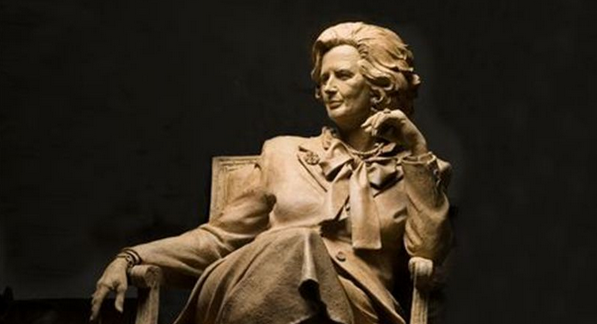The Moral Foundations of Democracy
by Margaret Thatcher
Democracy is never mentioned in the Bible. When people are gathered together, whether as families, communities or nations, their purpose is not to ascertain the will of the majority, but the will of the Holy Spirit. Nevertheless, I am an enthusiast of democracy because it is about more than the will of the majority. If it were only about the will of the majority, it would be the right of the majority to oppress the minority. The American Declaration of Independence and Constitution make it clear that this is not the case. There are certain rights which are human rights and which no government can displace. And when it comes to how you Americans exercise your rights under democracy, your hearts seem to be touched by something greater than yourselves. Your role in democracy does not end when you cast your vote in an election. It applies daily; the standards and values that are the moral foundations of society are also the foundations of your lives.
Democracy is essential to preserving freedom. As Lord Acton reminded us,
“Power tends to corrupt, and absolute power corrupts absolutely.”
If no individual can be trusted with power indefinitely, it is even more true that no government can be. It has to be checked, and the best way of doing so is through the will of the majority, bearing in mind that this will can never be a substitute for individual human rights.
I am often asked whether I think there will be a single international democracy, known as a “new world order.” Though many of us may yearn for one, I do not believe it will ever arrive. We are misleading ourselves about human nature when we say,
“Surely we’re too civilized, too reasonable, ever to go to war again,” or, “We can rely on our governments to get together and reconcile our differences.”
Tyrants are not moved by idealism. They are moved by naked ambition. Idealism did not stop Hitler; it did not stop Stalin. Our best hope as sovereign nations is to maintain strong defenses. Indeed, that has been one of the most important moral as well as geopolitical lessons of the 20th century. Dictators are encouraged by weakness; they are stopped by strength. By strength, of course, I do not merely mean military might but the resolve to use that might against evil.
The West did show sufficient resolve against Iraq during the Persian Gulf War. But we failed bitterly in Bosnia. In this case, instead of showing resolve, we preferred “diplomacy” and “consensus.” As a result, a quarter of a million people were massacred. This was a horror that I, for one, never expected to see again in my lifetime. But it happened. Who knows what tragedies the future holds if we do not learn from the repeated lessons of history? The price of freedom is still, and always will be, eternal vigilance.
Free societies demand more care and devotion than any others. They are, moreover, the only societies with moral foundations, and those foundations are evident in their political, economic, legal, cultural, and, most importantly, spiritual life.
We who are living in the West today are fortunate. Freedom has been bequeathed to us. We have not had to carve it out of nothing; we have not had to pay for it with our lives. Others before us have done so. But it would be a grave mistake to think that freedom requires nothing of us. Each of us has to earn freedom anew in order to possess it. We do so not just for our own sake, but for the sake of our children, so that they may build a better future that will sustain over the wider world the responsibilities and blessings of freedom.
